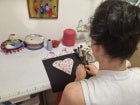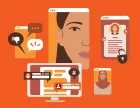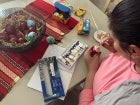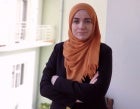Breadcrumb
Stories
Topic
- Show all (1276)
- Ending violence against women and girls (-) (72)
- Women’s movements (-) (7)
- Migration (-) (1)
- Gender equality and women’s empowerment (45)
- Anti-violence interventions (41)
- Gender discrimination (38)
- Gender equality and inequality (38)
- Domestic violence/interpersonal violence (36)
- Access to justice and legal protection (33)
- Legal assistance (29)
- Laws, legislation (26)
- Gender-responsive budgeting (24)
- Primary prevention (24)
- Sexual harassment (24)
- Feminicide/femicide (23)
- Service delivery (23)
- Economic empowerment (22)
- Rape/sexual assault (21)
- Employment (20)
- Shelters (20)
- Rural women (19)
- Entrepreneurship (18)
- Decision-making (16)
- Youth (16)
- Gender power relations (15)
- Women’s rights (15)
- COVID-19 (14)
- Financing for gender equality (13)
- Gender mainstreaming (13)
- Civil society (12)
- Gender, culture and society (12)
- Men and boys (masculinity) (12)
- Political empowerment (12)
- Access to basic services (11)
- Adolescents (11)
- Businesses and foundations (11)
- Girls (11)
- Human rights (11)
- UNiTE campaign (11)
- Beijing Platform for Action (10)
- Civil society participation (10)
- Peace and security (10)
- Safe Cities and Safe Public Spaces (10)
- Training (10)
- Women with disabilities (10)
- Convention on the Elimination of All Forms of Discrimination against Women (CEDAW) (9)
- Financial resources (9)
- Information and communications technology (ICT) (9)
- Leadership and political participation (9)
- National planning (9)
- Partnerships (9)
- Gender stereotypes (8)
- Governance (8)
- Innovation and technology (8)
- Institutional mechanisms (8)
- Peacebuilding (8)
- Social protection (8)
- Women farmers (8)
- Citizen engagement (7)
- Gender statistics (7)
- Generation Equality (7)
- Government contributors (7)
- Productive resources (7)
- Religion (7)
- Science and technology for development (7)
- Sports (7)
- Trafficking/sexual exploitation (7)
- 2030 Agenda for Sustainable Development (6)
- Child marriage (6)
- Communications and media (6)
- Electoral systems and processes (6)
- Lesbian, gay, bisexual, transgender, intersex (LGBT) rights (6)
- Markets (6)
- Political violence (6)
- Sex-disaggregated data (6)
- Sustainable Development Goals (SDGs) (6)
- Unpaid work (6)
- Accountability (5)
- Gender data production and collection (5)
- Governance and national planning (5)
- Rural development (5)
- Traditional media (5)
- Constitutions and legal reform (4)
- Gender data gaps (4)
- Gender data use and accessibility (4)
- Gender wage gap (4)
- Health (4)
- Intergovernmental processes (4)
- Land and property (4)
- New media (4)
- Poverty (4)
- Public administration (4)
- Rule of law (4)
- Schooling (4)
- Accountability in the UN system (3)
- Climate change (3)
- Crisis response and recovery (3)
- Education (3)
- Environmental protection (3)
- Gender equality indicators (3)
- Health care services (3)
- Inheritance rights (3)
- Living conditions (3)
- Media leadership (3)
- National mechanisms (3)
- National statistical systems (3)
- Parliamentary development (3)
- UN Security Council resolution 1325 (3)
- UN system coordination (3)
- Capacity development (2)
- Coordination, knowledge management (2)
- Disaster risk reduction (2)
- Food security (2)
- Fundamental freedoms (2)
- Fund for Gender Equality (2)
- Harmful practices (2)
- Humanitarian action (2)
- Human rights–based approach (2)
- Macroeconomic policies (2)
- Monitoring and evaluation (2)
- Planning and monitoring (2)
- Sexual and reproductive health and rights (2)
- UN Security Council resolutions (2)
- Urban development (2)
- Åsa Regnér, Deputy Executive Director for Policy, Programme, Civil Society and Intergovernmental Support (1)
- Children’s rights (1)
- Commission on the Status of Women (1)
- Executive Director (1)
- Financial and economic crisis (1)
- Green economy (1)
- Literacy (1)
- Local development (1)
- Maternal health (1)
- Monitoring, evaluation and reporting (1)
- Peace processes (1)
- Public sector reform (1)
- Sexuality (1)
- Temporary special measures, affirmative action (1)
- UN Trust Fund to End Violence against Women (1)
1 - 20 of 79 Results
Pagination
Date:
Women in Albania are key drivers of social and economic progress, yet they remain underrepresented in political leadership. To bridge this gap, UN Women Albania, with support from the Swedish Government, trained over 130 women and girls across the country, equipping them with the skills and networks needed to step into leadership roles.
Date:
The May 11, 2025, elections are a key moment to strengthen democracy and build on Albania’s progress in women’s political leadership. While the country ranks 44th globally for women in Parliament, sustaining these gains requires ongoing efforts to ensure participation and prevent setbacks.
Date:
10 September 2024 – UN Women in Albania organized in September a five-day Training of Trainers focused on women’s active participation in politics. 14 accomplished trainers were certified on political leadership and candidate training.
Date:
Over the past decades, women and girls around the world have demolished barriers, dismantled stereotypes and driven progress towards more just and equal societies. Women’s rights were recognised as fundamental and universal human rights.
Date:
On International Women’s Day, the People’s Advocate in cooperation with UN Women launched the ‘Femicide Watch’. This first of its kind initiative will collect and analyze data at the national level to promote more effective policies and mechanisms to prevent gender-based killings of women.
Date:
On the occasion of International Women’s Day, UN Women and students of the Faculty of Social Sciences in Albania launched a campaign to tackle gender stereotypes and discrimination, in partnership with Sophie Caffe, a popular coffee shop chain in the country. The initiative won first prize in a student “bootcamp” organized by UN Women as part of the joint UN programme "Leave No One Behind”.
Date:
How a women’s rights organization and the National Employment and Skills Agency in Albania are joining forces to support women survivors of violence integrate in the job market.
Date:
Forty one percent of Albanian women active online have experienced some form of technology-facilitated violence in their lifetime – the new research “The Dark Side of Digitalization: Technology-Facilitated Violence Against Women in Eastern Europe and Central Asia” shows.
Date:
They are asking for increased long-term, sustainable investments from government, private sector, foundations, and other donors to prevent violence against women and girls.
Date:
In a dedicated effort to promote gender equality and eliminate all forms of discrimination against women, Albania is preparing for its fifth report to the Committee on the Elimination of All Forms of Discrimination Against Women (CEDAW), scheduled for October 18, 2023.
Date:
After six years of dedicated work, the UN Women regional programme Ending Violence Against Women and Girls in the Western Balkans and Turkyie “Implementing Norms, Changing Minds” comes to a close. Civil society organizations, government representatives and partners met to take stock of achievements, challenges, and the way forward.
Date:
Supported by a small grant from the UN Trust Fund, the Center "Shelter Edlira Haxhiymeri", in close partnership with the Streha Center for LBT women survivors of domestic violence, runs a project to end violence against women and girls in four remote areas of Albania.
Date:
Around 20 journalists and media experts joined the media forum on "Media and Violence Against Women in Politics and Elections" organized prior to Albania’s Local Elections taking place on the 14th of May, by UN Women and its partner organization "Together for Life". Participants in the event discussed the various challenges faced by women in politics and elections and the crucial role of the media in addressing them.
Date:
A week-long events tackle gender discrimination in Albania with participants asking for equal representation in every space.
Date:
Aferdita Kote’s* old Nokia phone had only one contact: that of her husband of 10 years. He called her constantly to know her whereabouts. But she did not tell him when she got a new smartphone equipped with a mobile application (Bright Sky) to report violence.
Date:
Fabiola Laço Egro is the founder and leader of the “Today for the Future” Community Center as well as a member of National Council of Civil Society in Albania and the Monitoring Network against Gender-Based Violence. One of the most prominent civil society activists in Albania, Ms. Laço Egro shares her perspectives and lessons learned on building networks and alliances to advance the gender equality agenda.
Date:
Anjeza Bojaxhiu is the local coordinator of the domestic violence referral mechanism – a dedicated mechanism that aims to protect and support survivors of violence, composed of a team of community professionals in Tirana, Albania. With extensive experience in good local governance and social services for women and girls from disadvantaged groups, Ms. Bojaxhiu shares the most promising practices related to establishing and operating local referral systems as well as ways to address challenges that may arise.
Date:
The UN Women office in Albania teamed up with the government, civil society organizations, international partners, and other UN agencies operating in the country to mark this year's 16 Days of Activism against Gender-based Violence with a variety of public events, university lectures, trainings, social media campaigns and much more.
Date:
The Ministry of Health and Social Protection and UN Agencies in Albania launched the “16 Days of Activism against Gender-Based Violence” campaign supported by UN Women. The event brought together government and international partners, feminists, women’s rights activists, as well as many others who work every day to prevent and eliminate violence against women and girls.
Date:
Afërdita Prroni, the Executive Director of the Human Rights in Democracy Center, a grassroot civil society organization involved in promoting and protecting human rights in Albania, has been working to strengthen the implementation of the domestic violence law under UN Joint Programme on “Ending Violence Against Women in Albania” and UN Women’s project “Gender sensitive post-earthquake recovery and reconstruction” funded by the Swedish Government.
1 - 20 of 79 Results


















